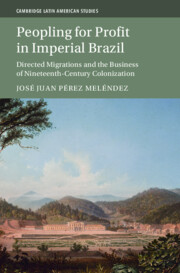 Peopling for Profit in Imperial Brazil
Peopling for Profit in Imperial Brazil Book contents
- Peopling for Profit in Imperial Brazil
- Cambridge Latin American Studies
- Peopling for Profit in Imperial Brazil
- Copyright page
- Dedication
- Contents
- Figures
- Tables
- Acknowledgments
- Note on Currency and Language
- Abbreviations
- Maps
- Introduction
- Part I Colonization’s Statecraft
- Part II Colonization Companies and the Colono Trade
- Part III Disentangling Companies and State
- 6 Cabinets and Companies
- 7 The Dregs of War
- 8 Coolies and Scandals
- Part IV Peopling the Country of the Future
- Conclusion
- Bibliography
- Index
- Series page
6 - Cabinets and Companies
Testing the Limits of the State
from Part III - Disentangling Companies and State
Published online by Cambridge University Press: 26 September 2024
- Peopling for Profit in Imperial Brazil
- Cambridge Latin American Studies
- Peopling for Profit in Imperial Brazil
- Copyright page
- Dedication
- Contents
- Figures
- Tables
- Acknowledgments
- Note on Currency and Language
- Abbreviations
- Maps
- Introduction
- Part I Colonization’s Statecraft
- Part II Colonization Companies and the Colono Trade
- Part III Disentangling Companies and State
- 6 Cabinets and Companies
- 7 The Dregs of War
- 8 Coolies and Scandals
- Part IV Peopling the Country of the Future
- Conclusion
- Bibliography
- Index
- Series page
Summary
This chapter tells the story of two of the most notorious and ambitious company efforts in nineteenth-century Brazil, which, taken together dispel the notion that the end of the “conciliation period” had produced any lasting government neutrality in relation to private enterprise. The Mucury Company, founded by liberal stalwart Teófilo Ottoni, faced unlikely competition from the new Associação Central de Colonização, a state-favored company established in Rio. While Ottoni incorporated agents and techniques from previous colonization efforts, devised his own indigenous appeasement policies, and successfully orchestrated migrations to his flagship colony of Filadelfia, the ACC focused solely on migrant recruitment, transport, and reception, and received ample government subsidies to guarantee shareholder dividends. The ACC quickly overtook Ottoni’s colono recruitment efforts thanks to the support of prime minister Olinda, who was attempting to counter international criticisms of Brazilian colonization and define pertinent regulatory frameworks while harboring distrust toward Ottoni’s political aims. While both companies eventually folded, they did so for different reasons. In turn, the regulations devised by Olinda in his engagement with them became landmark precedents for the era of mass migrations.
Keywords
- Type
- Chapter
- Information
- Peopling for Profit in Imperial BrazilDirected Migrations and the Business of Nineteenth-Century Colonization, pp. 187 - 223Publisher: Cambridge University PressPrint publication year: 2024
